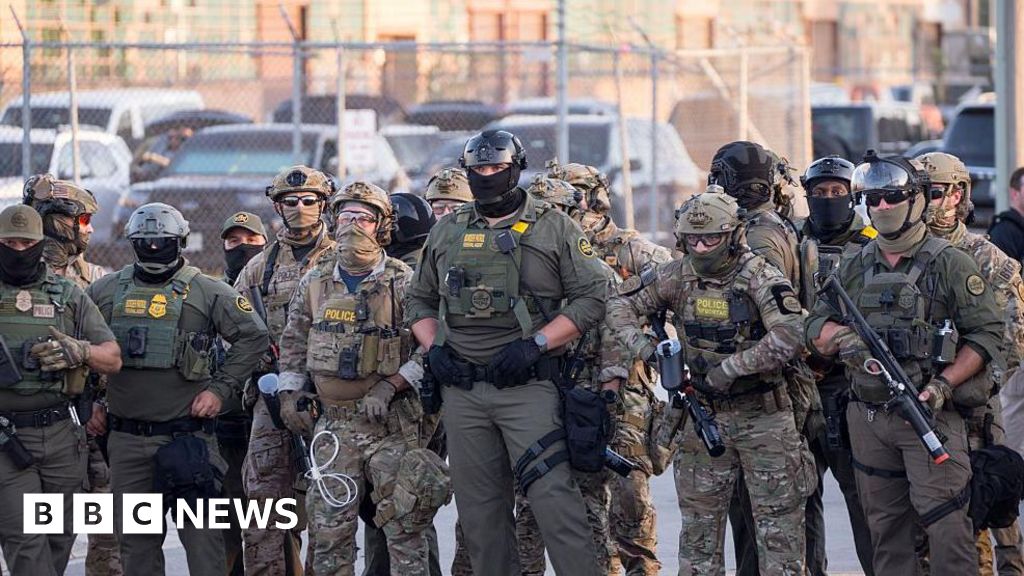
The President’s recent declaration, promising to deploy “more than the National Guard” to American cities, regardless of local sentiment [2], [6], lays bare an administration’s calculated contempt for established norms and local sovereignty. This isn’t a new initiative; it’s an unsettling escalation of a pattern we’ve meticulously tracked. For months, federal forces, primarily the National Guard, have been wielded as a blunt instrument in a politically charged campaign, conspicuously targeting primarily Democratic-led urban centers across the nation [5], [6], [7]. The official line, spun with predictable ease, cites cities as “rampantly crime-infested” [7], a convenient pretext for intervention. But the reality, observed from behind the opaque doors of federal decision-making, reveals a far more cynical and calculated power play, meticulously designed to bypass local governance and assert federal authority where it is explicitly unwelcome and often unnecessary.
The Urban Campaign: A Federal Footprint of Control
The blueprint for this federal intervention is by now well-worn, yet increasingly aggressive. We’ve witnessed the methodical deployment of National Guard troops to a litany of major U.S. cities including Los Angeles, Washington D.C., Memphis, Chicago, and Portland [2], [5]. The President has repeatedly pushed for these deployments, often directly challenging and overriding local and state leadership, displaying a remarkable disregard for established lines of authority [6].
Consider the insistent, often contentious, moves to federalize Guard troops from Texas for deployment to Chicago and Portland, cities far beyond their home state [1], [4]. Similarly, California-based Guard troops were designated for Portland, a unilateral decision that prompted California’s governor to threaten immediate legal action, highlighting the severe overreach at play [1], [3]. These deployments and attempted deployments were not simply about bolstering local law enforcement capabilities; they were about imposing a federal presence, an undeniable show of force.
These actions weren’t isolated incidents but components of a broader, strategically executed maneuver. The President himself, with characteristic detachment, was observed questioning the public perception of Portland before greenlighting military plans, musing aloud if his television view of chaos truly differed from the on-the-ground reality [3]. This suggests a narrative-driven motivation rather than a solely fact-based assessment. He has overseen the mobilization of as many as 1,700 National Guard troops across 19 states, all under the broad and often vague banner of a “crime crackdown” [3]. In late September, an astonishing 400 members of the Texas Guard were called up for duties specifically beyond Texas borders, earmarked with unsettling precision for Portland and Chicago [4]. Just weeks later, another 200 Oregon Guard troops were federalized for deployment in their own state’s city of Portland, purportedly due to ongoing ICE-related protests [4]. This intricate web of deployments, often over the fervent objections of local authorities, paints a clear picture: this administration is not just interested in reducing crime; it is intent on planting a federal flag on urban turf, whether local officials, or indeed the local populace, like it or not [6].
The Unvarnished Truth of Legal Battles and Constitutional Fault Lines
The Executive’s aggressively unilateral deployment strategy has, with predictable friction, triggered a flurry of intense legal challenges, laying bare the deeply contentious nature of these interventions and exposing critical constitutional fault lines. The pushback has been significant, often coming directly from the cities and states whose sovereign authority was being flagrantly undermined. This isn’t merely political disagreement; it’s a fight over foundational principles of American governance.
In Chicago, the President’s rationale for troop deployment faced intense judicial scrutiny. An appeals court flatly rejected his reasoning, delivering a scathing rebuke by unequivocally stating that “political opposition is not rebellion” [3]. This powerful ruling cut through the administration’s carefully constructed narrative of necessary intervention, exposing the deployments as potentially more about stifling dissent and asserting political control than addressing genuine public safety concerns. It was a crucial reminder that the power of the federal government is not limitless, particularly when it encroaches upon the rights of states and citizens.
Portland, a consistent flashpoint, became a particularly fertile ground for these legal skirmishes. A federal judge initially blocked the President’s National Guard deployment there, a decisive order that was courageously reiterated a second time following renewed attempts [3]. These rulings were significant victories for local control, emphasizing the limits of federal power. However, the legal landscape, as is often the case in high-stakes political battles, shifted. An appeals court, in a subsequent ruling, eventually backed the President’s National Guard deployment in Portland [3]. This legal whiplash underscores the precarious balance of power, the contested interpretations of executive authority, and the deeply divided judiciary navigating domestic military deployments. It highlights the vulnerability of local control when confronted by a determined federal executive.
Beyond these city-specific battles, a broader and profoundly significant legal precedent emerged concerning the use of military forces in California. A federal judge found, in no uncertain terms, that the President’s use of the military violated the Posse Comitatus Act [4]. This crucial law, dating back to 1878, strictly limits the use of federal military personnel for domestic law enforcement purposes, a cornerstone of American civil-military relations. This ruling specifically enjoined the federal government from utilizing military troops in immigration raids or other law enforcement operations within California [4]. It was a vital, if localized, victory for civil liberties and for maintaining the critical delineation between military and civilian roles, a principle essential to a democratic society. Furthermore, California’s Governor, in an unprecedented move, threatened to sue over the President’s attempts to send California’s own National Guard troops to Oregon, further illustrating the severe friction and legal quagmire these deployments created [3].
These escalating legal fights illuminate a critical fault line in American governance: the President’s expansive power to deploy troops domestically versus the inherent rights of states and municipalities to self-govern and manage their own affairs. The official spin, perpetually delivered with unwavering confidence, attempts to frame these deployments as indispensable responses to urban chaos. But the courts, at least sometimes, have seen through the thinly veiled pretense, revealing a more complex and troubling reality rooted in an unyielding contest for power and federal overreach.
Beyond the Guard: A Vision of Unchecked Federal Might
The ominous phrase “more than the National Guard” [2], [6] reverberates with profoundly unsettling implications. The National Guard, while capable of federalization, still retains a crucial, if sometimes tenuous, connection to state authority; their deployment, even under federal orders, comes with certain constraints and expectations. But what, precisely, does “more than” truly imply? It suggests a chilling potential for deploying active-duty military personnel, federal law enforcement agencies with vastly broader powers, or even overtly paramilitary forces, all under direct presidential command and potentially without the legal limitations and checks that have, thus far, at least partially reined in the Guard.
This prospect is not just theoretical; it’s the logical, albeit alarming, next step in an administration’s demonstrated pattern of centralized control and a defiant disregard for local objections [6]. The pervasive narrative that cities are “rampantly crime-infested” [7] serves as a disturbingly convenient pretext for this proposed expansion of federal power. It skillfully presents a simplistic, often infuriatingly inadequate, explanation for deeply complex societal issues, thereby neatly justifying an increasingly authoritarian solution. The unvarnished truth is that this rhetoric meticulously paves the way for a top-down assertion of power, transforming legitimate local civil unrest or political dissent into a dangerous excuse for unchecked federal military intervention.
This proposed move signals a dramatic and potentially irreversible shift in the fundamental relationship between federal power and urban governance. It’s a calculated attempt to normalize the pervasive presence of federalized military-like forces in civilian spaces, deliberately blurring the critical lines between domestic law enforcement and what can only be described as military occupation. The cynical implication is glaringly clear: if local leaders won’t bend to the federal will, the federal government will simply impose its will, whether the people, or their elected representatives, like it or not. This is not about law and order in the traditional, civic sense; it’s about a raw, unadulterated display of presidential power, backed by a seemingly endless array of federal resources, ready to be deployed against American citizens in their own communities. The receipts are clear, the pattern unequivocally established, and the threat explicitly articulated. The critical question remains, stark and unanswered: what genuine limits will truly hold this escalating assertion of federal might?
Sources & Footnotes
- https://www.nytimes.com/interactive/2025/10/27/us/us-national-guard-deployments.html ↩
- https://thehill.com/homenews/state-watch/5576016-trump-national-guard-deployment-speech-japan/ ↩
- https://en.wikipedia.org/wiki/2025_deployment_of_federal_forces_in_the_United_States ↩
- https://www.democracydocket.com/analysis/trump-military-deployments-democratic-led-cities-legal-fight/ ↩
- https://www.scotusblog.com/2025/10/the-presidents-power-to-deploy-troops-domestically-an-explainer/ ↩
- https://www.nytimes.com/2025/10/28/us/politics/trump-japan-national-guard-us-cities.html ↩
- https://www.youtube.com/watch?v=w2lbAg4H7XA ↩

Leave a Reply